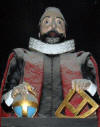
John BLAGRAVE
Born: ABT 1561, probably at Bulmershe, Sonning, Berkshire, England
Died: 9 Aug 1611, Southcote, Reading, Berkshire, England
Buried: St. Lawrence Church, Reading, Berkshire, England
Father: John BLAGRAVE of Bulmershe Court
Mother: Anne HUNGERFORD
Married: ¿?
© Copyright of David Nash Ford.
Biography reproduced by kind permission of the Royal Berkshire History Website.
John Blagrave, the famous mathematician, was the son of John Blagrave of Bulmershe Court, near Sonning in Berkshire, by Anne, daughter of Sir Anthony Hungerford of Down Ampney in Gloucestershire (as well as East Shefford). He was born in Reading, but the date of his birth is unknown: probably early in the 1560s. He received his early education in his native town and, afterwards, entered St. John's College, Oxford. He did not, however, take a degree, but retired to his patrimony at Southcote Manor (Reading). He also had houses on the Seven Bridges in the town and at Swallowfield. John devoted himself to his favourite study of mathematics and became esteemed, as Anthony Wood declares, 'the flower of mathematicians of his age'.
He published four works: 1. The Mathematical Jewel, showing the making and most excellent use of a singular instrument so called, in that it performeth with wonderful dexterity whatever is to be done either by quadrant, ship, circle, cylinder, ring, dial, horoscope, astrolabe, sphere, globe or any such like heretofore devised (1585). 2. Baculum, Familliare Catholicon sive Generale: a book of the making and use of a staff newly invented by the author, called the Familiar Staff, as well for that it may be made usually and familiarly to walk with as for that it performeth the geometrical mensurations of all altitudes (1590). 3. Astrolabium Uranicum Generale: a necessary and pleasant solace and recreation for navigators in their long journeying (1596). 4. The Art of Dialling, in two parts (1609).
In private life, Blagrave was distinguished for his charity. He concerned himself with the welbeing of others and is once said to have have cast out a dumb devil from a maid at Basingstoke (Hampshire) by invoking the name of the Tetragrammaton and that of the Blessed Trinity. His father settled upon him, in 1591, the lease for ninety-nine years of lands in Southcote, which he in turn bequeathed this to his nephew, the regicide Daniel Blagrave, son of Alexander Blagrave of Southcote Manor, the famous Chess-Player, and his wife, Margaret; and as many as eighty other relatives are said to have benefited from his will. To his native town of Reading, he left certain legacies, one of which provided annually the sum of twenty nobles to be competed for by three maid servants of good character and five years' service under one master, to be selected by the three parishes of the town. The whimsical conditions of this bequest required that the maids should appear on Good Friday in the town hall before the mayor and aldermen and, there, cast lots for the prize. The losers had the right of competing a second and third time.
Blagrave died on 9 Aug 1611 and was buried, in the same grave as his mother, in the church of St. Lawrence in Reading, wherein an elaborate monument of himself, surrounded by allegorical figures, was erected by Gerard Christmas. He married a widow, whose daughter is named in his will, but he left no issue.
Edited from Leslie Stephens & Sidney Lee's "Dictionary of National Biography" (1891).
 to Bios
Page
to Bios
Page |
 to Home Page
to Home Page |